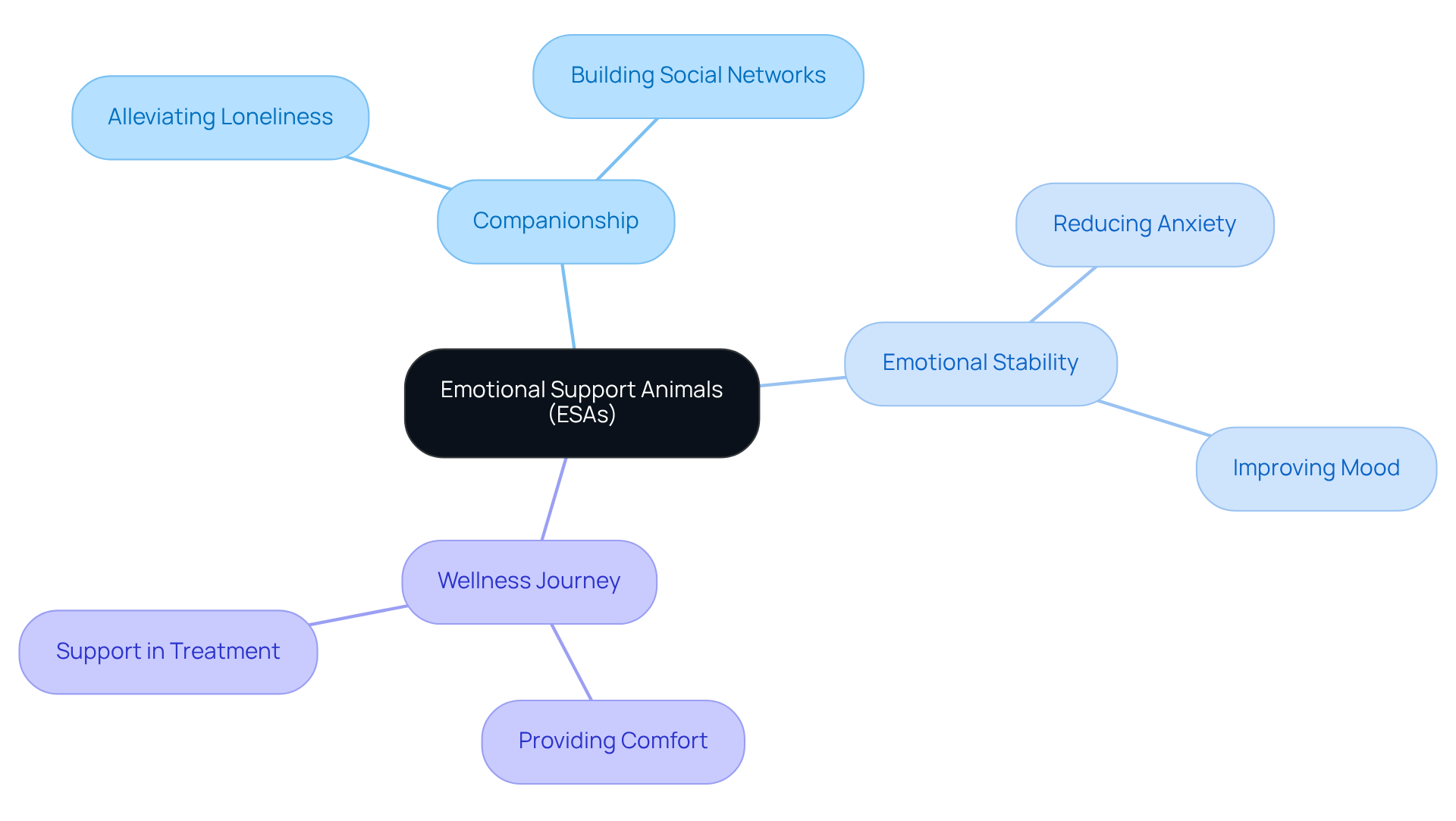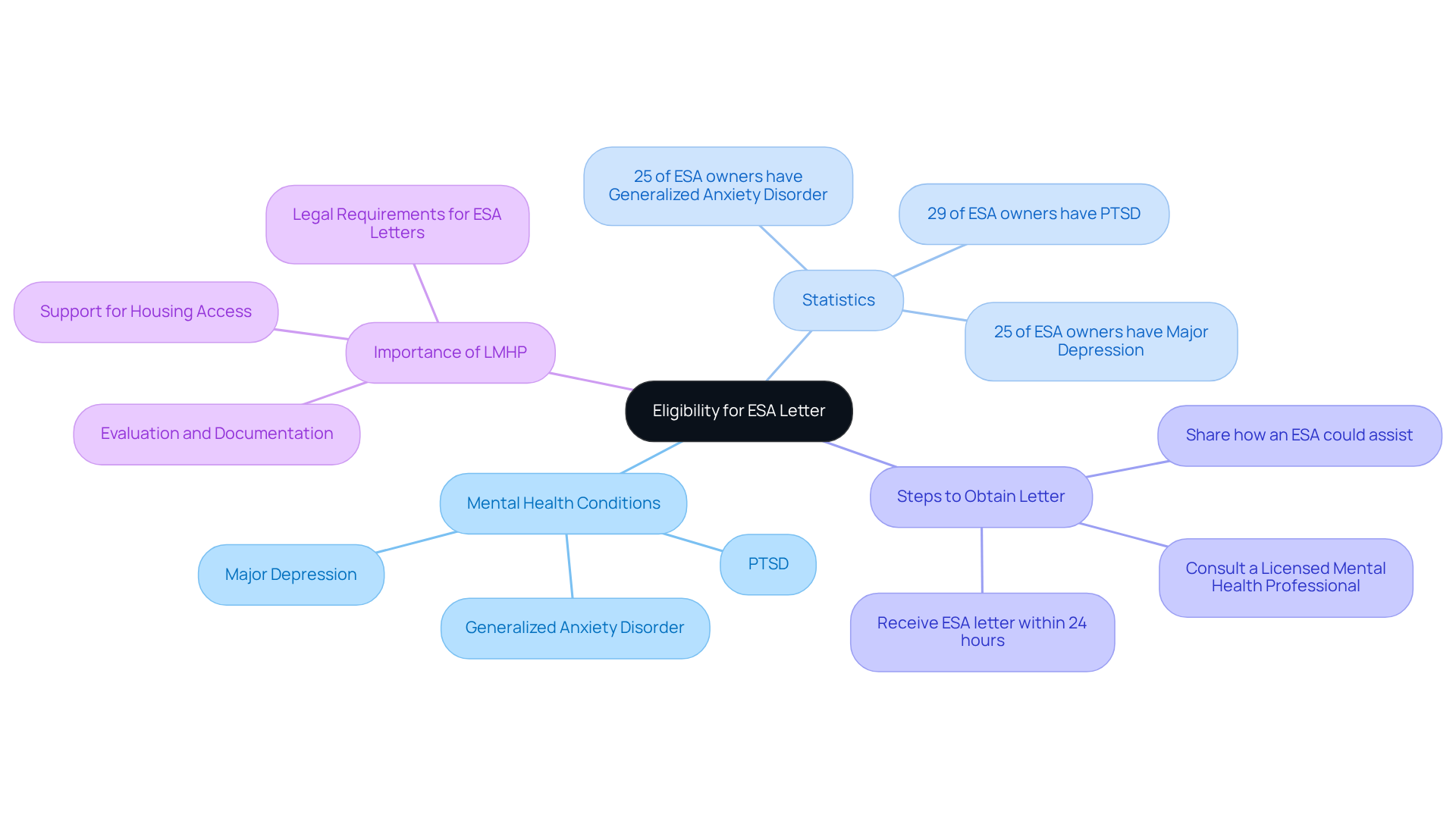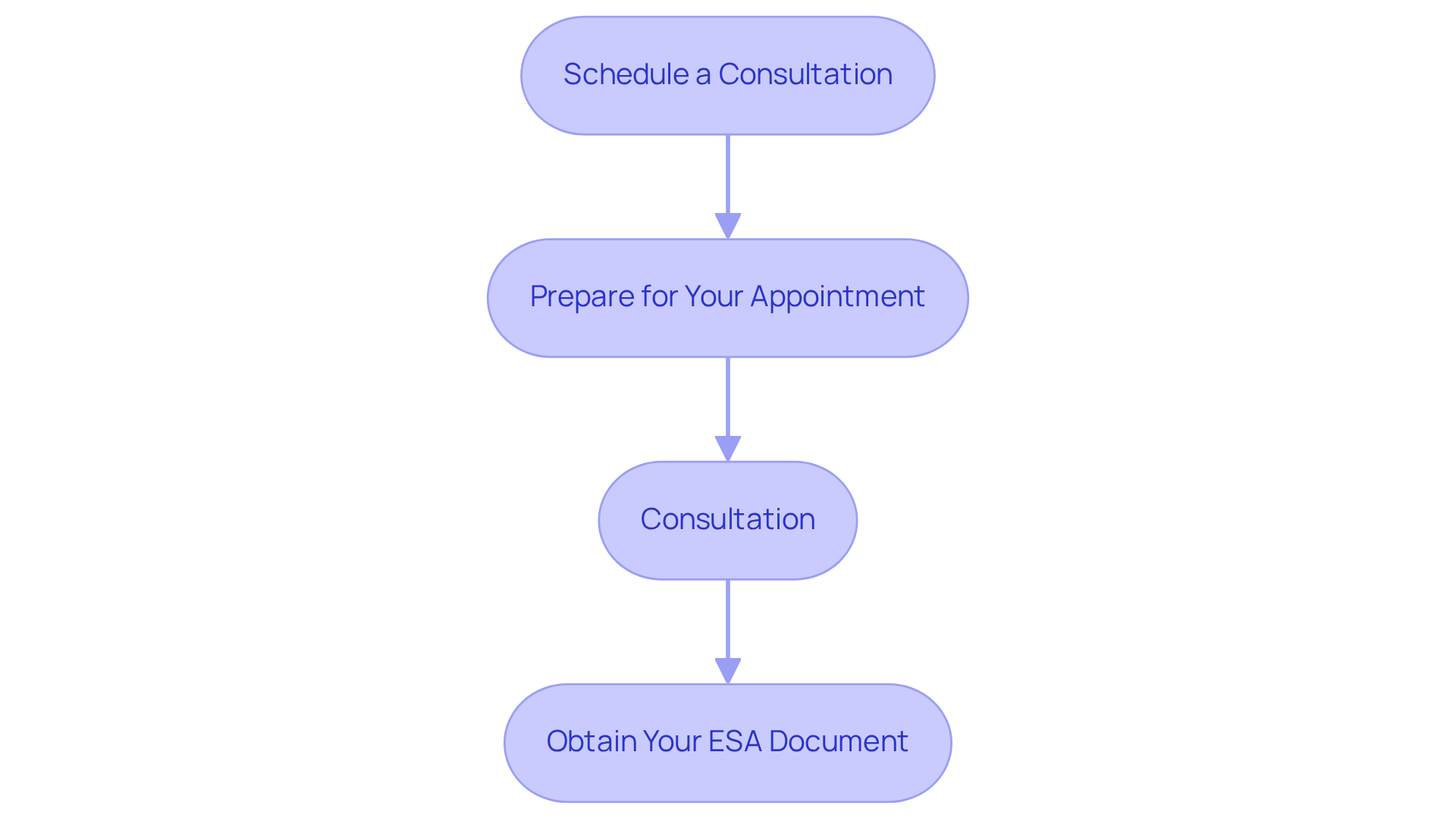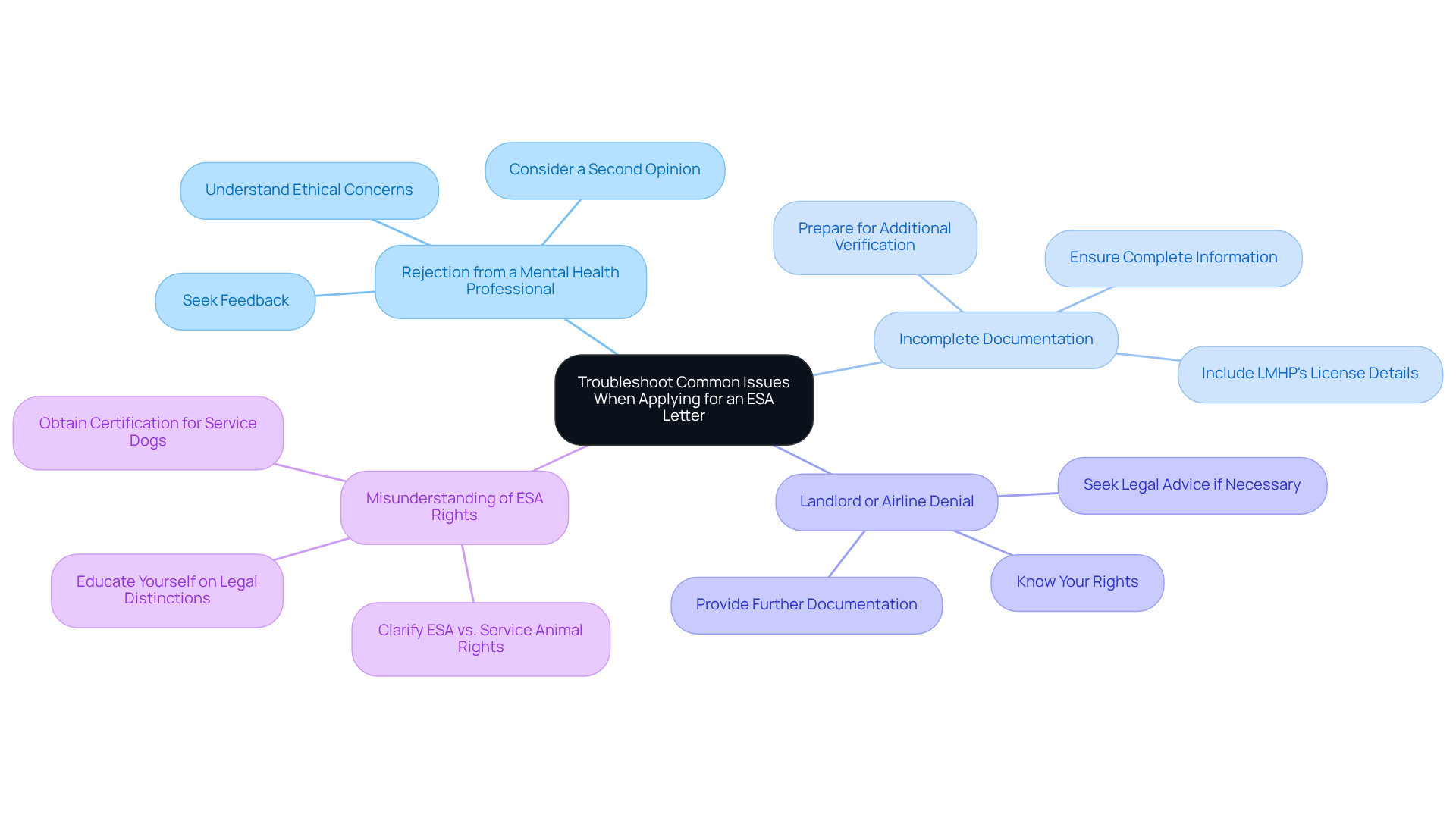

4 Steps to Obtain Your Support Animal Letter Easily
by Lena Park
Last updated: July 9, 2025
Verified and Approved by:
Angela Morris,
MSW, LCSW
Fact Checked

Overview
Navigating mental health challenges can be incredibly tough, and many individuals find themselves in need of support. The process of obtaining a support animal letter is designed to be straightforward and compassionate, consisting of four essential steps:
- Consulting with a licensed mental health professional allows for an understanding of your unique needs.
- Preparing for the appointment ensures that you can express your feelings and concerns effectively.
- Once you receive the evaluation, you can begin to see the light at the end of the tunnel.
- Finally, securing the official documentation brings you closer to accessing the emotional support that an animal can provide.
This process is not just about paperwork; it’s about addressing your mental health needs in a meaningful way. Emotional support animals can offer comfort and companionship, helping to alleviate feelings of loneliness and anxiety. Knowing that there is a pathway to this support can be incredibly reassuring. Remember, you are not alone in this journey, and there is help available to you every step of the way.
Introduction
Emotional Support Animals (ESAs) have emerged as vital companions for individuals navigating the emotional and psychological challenges of life. They provide comfort and stability during turbulent times, offering a sense of security that can be life-changing.
For those seeking to enhance their well-being through the companionship of an ESA, understanding the process of obtaining a support animal letter is essential. Yet, the journey can often feel overwhelming, filled with uncertainty about eligibility criteria and application procedures.
What steps must one take to secure this important documentation? How can potential hurdles be addressed with confidence and clarity? Recognizing these concerns is the first step towards finding a compassionate solution that supports your emotional journey.
Understand Emotional Support Animals and Their Benefits
Emotional Support Animals (ESAs) serve as loving companions for individuals grappling with emotional or psychological challenges. Unlike service animals, ESAs do not need specialized training; their primary purpose is to offer companionship and emotional stability.
Have you ever felt the weight of loneliness, anxiety, or depression? Research indicates that the presence of an ESA can significantly alleviate these feelings, making a profound difference in one’s emotional landscape. For many, the bond with their pet becomes an essential part of their wellness journey, underscoring the importance of recognizing the benefits that an ESA can provide.
Imagine having a furry friend by your side, offering comfort during tough times. This connection can be a crucial aspect of your treatment plan, providing not just companionship but also a sense of purpose and stability. Understanding the advantages of having an ESA is vital, as it can lead to a more fulfilling life.
With the right support, including a support animal letter, you can embrace the love and comfort that these special animals bring into your life. Remember, you are not alone on this journey; support is available, and ESAs can play a significant role in your healing process.

Determine Your Eligibility for an ESA Letter
Navigating mental health challenges can be incredibly difficult, and for many individuals, the weight of conditions like anxiety, depression, or PTSD can feel overwhelming. To qualify for a support animal letter through Wellness Wag’s streamlined online process, it’s essential to have a diagnosed psychological condition. You are not alone in this struggle; approximately 26% of adults face a diagnosable psychological disorder each year. A licensed mental health professional (LMHP) can provide the evaluation and documentation needed to support your eligibility. If you believe you might qualify, consider reaching out to a therapist or psychiatrist who can help assess your psychological needs.
During your consultation, it’s important to share how an ESA could assist you in managing your condition. This conversation is vital, as it enables the LMHP to understand your unique situation and the potential benefits of having an ESA. Emotional Support Animals can offer comfort to students with disabilities, alleviating symptoms related to their conditions and promoting an equal opportunity to fully enjoy residential life. Common qualifying psychological conditions include:
- generalized anxiety disorder
- major depression
- post-traumatic stress disorder
These conditions affect a significant portion of the population. Research indicates that nearly 25% of ESA owners have generalized anxiety disorder, while 29% have PTSD.
Citations from certified psychological practitioners underscore the importance of accurate documentation:
‘Legally, to qualify for an ESA, you must acquire a support animal letter from a qualified professional indicating that you require an emotional support animal to ease symptoms of a recognized psychiatric condition.’
This reinforces the necessity of collaborating with certified experts to ensure your support animal letter meets legal requirements and effectively addresses your emotional support needs, especially when it comes to securing housing access for students. Remember, you are taking a positive step towards healing, and support is available to guide you through this journey.

Follow the Step-by-Step Process to Obtain Your ESA Letter
- Schedule a Consultation: Begin this journey by seeking out a licensed professional in psychology who understands the unique needs surrounding Emotional Support Animals (ESAs). You can explore online resources or ask for recommendations to find a compassionate provider. Once you’ve identified someone, arrange a meeting to discuss your emotional well-being and the potential benefits an ESA can offer.
- Prepare for Your Appointment: Before your consultation, it’s helpful to gather any relevant medical records or documentation that could support your case. Be prepared to share your psychological history, including specific challenges such as anxiety, depression, or PTSD, and articulate how an ESA could positively impact your life.
- Consultation: During your appointment, it’s vital to be open and honest about your mental health struggles. The licensed mental health professional (LMHP) will conduct a thorough evaluation to assess whether an ESA is suitable for you. If they conclude that an ESA would be beneficial, they will provide you with a support animal letter, which serves as official verification of your need for an emotional support animal.
- Obtain Your ESA Document: Once approved, ensure that your ESA document contains the LMHP’s contact information, license number, and a clear statement confirming your need for an ESA. This document, including a support animal letter, is crucial for securing housing and travel accommodations, as it provides the necessary legal documentation to advocate for your rights under the Fair Housing Act and the Air Carrier Access Act.

Troubleshoot Common Issues When Applying for an ESA Letter
-
Rejection from a Mental Health Professional: If your request for an ESA document is denied, it can be disheartening. It’s important to seek feedback on the reasons for the rejection, as many psychological experts express concerns about the ethical implications of issuing ESA documents without sufficient proof of necessity. If you feel comfortable, consider reaching out to another licensed mental health professional (LMHP) who can provide a support animal letter for ESAs. A second opinion can offer a fresh perspective and potentially support your needs.
-
Having complete and accurate documentation is crucial for your support animal letter, as incomplete documentation can lead to issues. Ensure it includes all necessary information, such as the LMHP’s license number and contact details. Incomplete documentation is a common reason for rejection, and landlords or airlines may request additional verification. Being prepared with a support animal letter and thorough documentation can help alleviate these challenges and provide peace of mind.
-
Landlord or Airline Denial: If your ESA letter is valid yet your landlord or airline denies your request, it’s essential to understand your rights under the Fair Housing Act and the Air Carrier Access Act. Familiarizing yourself with these laws can empower you, as they protect your right to have an ESA in pet-restricted housing and during travel. If faced with denial, consider providing further documentation or seeking legal advice to effectively advocate for your rights.
-
Misunderstanding of ESA Rights: Many individuals may mistakenly think that ESAs have the same access rights as service animals, which can lead to confusion and frustration. It’s vital to clarify that while service dogs are granted full public access rights under the Americans with Disabilities Act (ADA), there is no legal requirement for service dogs to be certified or registered. Educating yourself about the legal distinctions between ESAs and service animals is essential. Additionally, obtaining certification for service dogs can enhance credibility and ensure they meet specific training standards. Understanding these rights can empower you to advocate for your needs and navigate potential misunderstandings with landlords or airlines.

Conclusion
Emotional Support Animals (ESAs) play a vital role in enhancing the well-being of individuals grappling with emotional or psychological challenges. These animals provide companionship and stability, significantly improving one’s quality of life. For those navigating these emotional struggles, understanding the process to obtain a support animal letter is an essential step. It opens the door to the benefits that an ESA can offer, ensuring individuals can find the support they need.
The article outlines a clear four-step process to secure your ESA letter:
- Schedule a consultation with a licensed mental health professional.
- Gather the necessary documentation.
- Understand the importance of eligibility.
- Address common issues that may arise during the application process.
Each step is designed to empower individuals, equipping them with the knowledge and resources to advocate effectively for their emotional support needs.
Ultimately, the journey to obtaining an ESA letter not only paves the way for the companionship of a loving animal but also fosters a deeper understanding of one’s mental health needs. Embracing the support that ESAs provide can lead to a more fulfilling life. It is crucial to take proactive steps toward healing and to seek the assistance of qualified professionals who can guide you through this process. By doing so, individuals can harness the transformative power of emotional support animals and nurture a healthier emotional landscape.
Frequently Asked Questions
What is an Emotional Support Animal (ESA)?
An Emotional Support Animal (ESA) is a companion animal that provides emotional stability and support to individuals dealing with emotional or psychological challenges. Unlike service animals, ESAs do not require specialized training.
How do ESAs help individuals with emotional challenges?
ESAs can significantly alleviate feelings of loneliness, anxiety, or depression, making a profound difference in a person’s emotional landscape. The bond with an ESA can be an essential part of an individual’s wellness journey.
What role does an ESA play in a treatment plan?
An ESA offers companionship, comfort, and a sense of purpose during tough times, which can be a crucial aspect of an individual’s treatment plan and overall healing process.
Is a support animal letter necessary for having an ESA?
Yes, having a support animal letter can provide the necessary documentation to embrace the love and comfort that an ESA brings into your life.
Can ESAs help improve the quality of life?
Yes, understanding the advantages of having an ESA can lead to a more fulfilling life by providing emotional support and companionship.
Certify Your Emotional Support Animal Today

Why You Can Rely on Us?
At Wellness Wag, we believe your pet deserves care rooted in both science and compassion. Each article is carefully researched, written in clear language for pet owners, and then reviewed by qualified professionals to ensure the information is evidence-based, current, and practical for real-life care. Our goal is to help you feel confident in making informed decisions about your pet’s health and well-being.
Reviewed by
Angela Morris, MSW, LCSW
Angela is a licensed clinical social worker with 20 years of experience in patient advocacy and community mental health. She has assisted numerous clients with ESA evaluations and brings a deep understanding of disability accommodations, ensuring that all information is accurate, supportive, and practical.

Written by :
Lena Park
Last Updated :
July 9, 2025












